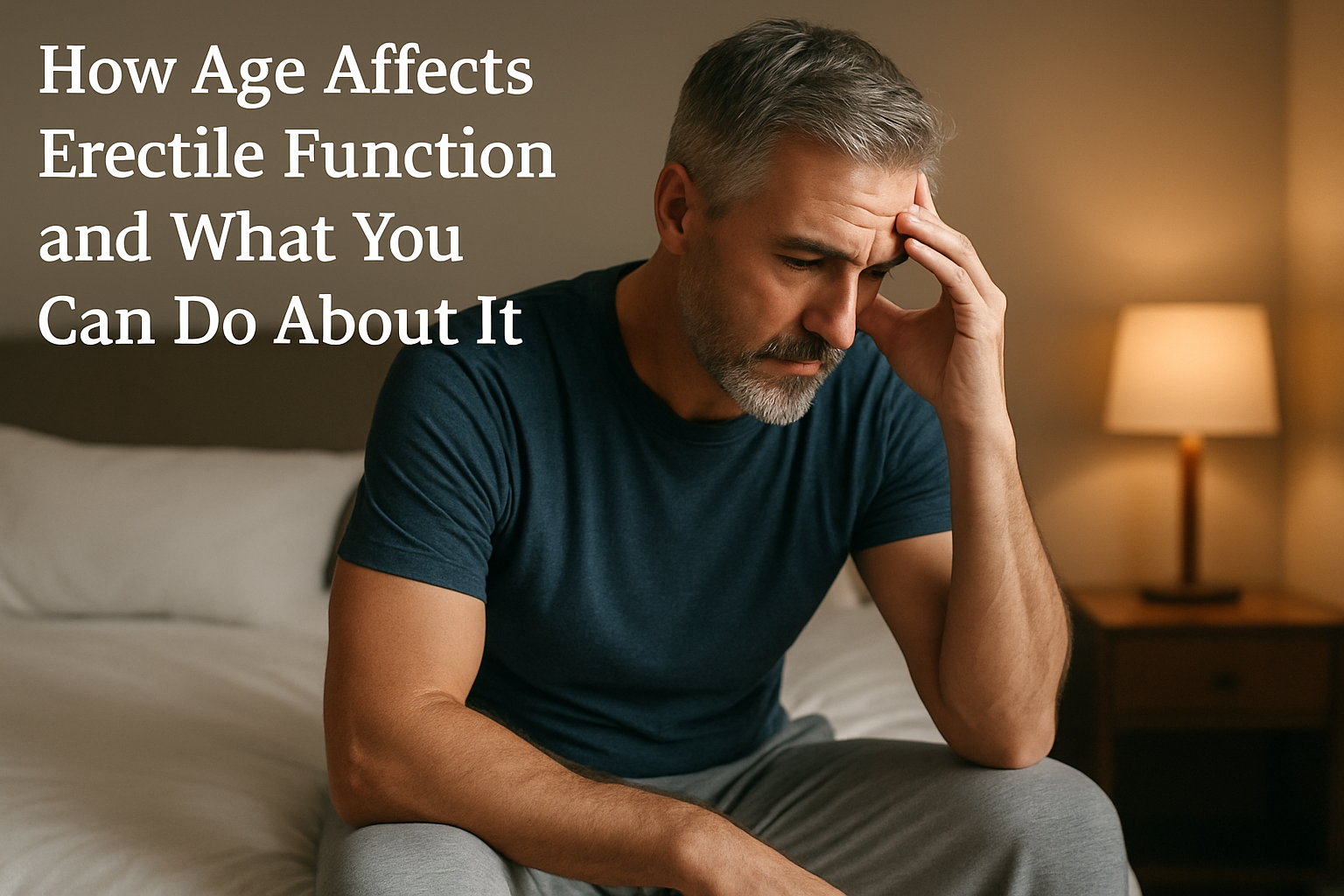Aging Is Natural — Erectile Dysfunction Doesn’t Have to Be
As men get older, it’s common to notice changes in sexual performance. Erections may become less spontaneous, take longer to develop, or not be as firm as they once were. While aging does bring physiological changes, erectile dysfunction (ED) is not an inevitable part of getting older. Understanding how age influences sexual health — and what you can do to support your body — can help you maintain confidence, intimacy, and pleasure well into your later years.
What Happens to Erections as You Age
Erections rely on healthy blood vessels, flexible tissues, responsive nerves, and balanced hormones. As you age, the following changes may occur:
- Reduced blood flow: Arteries may stiffen and narrow over time, limiting circulation to the penis
- Lower testosterone levels: Testosterone naturally declines about 1% per year after age 30, which can reduce libido and arousal
- Decreased nerve sensitivity: The signals from brain to body may slow slightly, making arousal take longer
- Muscle tissue changes: The smooth muscle in the penis may weaken or become less elastic, affecting firmness
These changes are gradual, but they can impact the timing, strength, and duration of erections — especially if compounded by poor lifestyle habits or health conditions.
Common Myths About Aging and ED
One major myth is that every man will develop ED as he ages. In reality, while ED becomes more common with age, it is not guaranteed. Many men in their 50s, 60s, and 70s have active and satisfying sex lives. Another myth is that older men shouldn’t care about sex — but studies show that sexual satisfaction contributes to happiness, emotional connection, and even longer life expectancy. Age may change how sex looks or feels, but it does not remove its importance or value.
What Increases ED Risk as You Age
While aging itself contributes to slower arousal and weaker erections, other age-related factors increase the risk of ED:
- High blood pressure and heart disease
- Type 2 diabetes or insulin resistance
- Obesity or metabolic syndrome
- Medication side effects (especially blood pressure meds and antidepressants)
- Sleep apnea and poor sleep
- Depression or anxiety
- Sedentary lifestyle and loss of muscle mass
The good news? Most of these factors are modifiable — meaning you can make lifestyle changes to reduce their impact and improve sexual performance at any age.
Natural Ways to Support Erections as You Age
Exercise Regularly
Physical activity improves circulation, raises testosterone, boosts mood, and supports weight management — all essential for healthy sexual function. Focus on a combination of cardio, strength training, and flexibility. Even walking 30 minutes a day can significantly reduce ED risk.
Maintain a Healthy Weight
Excess belly fat lowers testosterone and increases inflammation. Losing weight can improve erectile function and help restore hormone balance.
Eat a Heart-Healthy Diet
A Mediterranean-style diet rich in vegetables, fruits, whole grains, lean proteins, and healthy fats supports vascular health. This improves blood flow to the penis and protects against age-related decline.
Prioritize Sleep
Sleep is critical for hormone production and recovery. Aim for 7–9 hours per night. If you snore or feel exhausted during the day, get screened for sleep apnea — a common but underdiagnosed condition linked to ED.
Manage Stress and Mental Health
Chronic stress and anxiety raise cortisol and reduce testosterone. Mindfulness, deep breathing, therapy, and meaningful hobbies help protect emotional and sexual well-being.
Avoid Smoking and Limit Alcohol
Smoking damages blood vessels and is a major contributor to ED. Excessive alcohol also disrupts hormone balance and nerve function. Quitting or reducing these habits can lead to noticeable improvements.
Consider Medical Support
If lifestyle changes aren’t enough, modern medicine offers safe and effective treatments for ED in older men. Options include:
- Oral medications like sildenafil (Viagra), tadalafil (Cialis), and others
- Penile injections or intraurethral therapies
- Vacuum erection devices (VEDs)
- Penile implants in severe or long-term cases
Always talk to your doctor before starting any medication, especially if you take medications for heart disease or blood pressure.
Don’t Ignore Testosterone
If you’re over 40 and struggling with low libido, fatigue, or depression in addition to ED, consider getting your testosterone levels tested. Natural ways to boost testosterone include lifting weights, sleeping better, and managing stress. In some cases, testosterone replacement therapy (TRT) may be appropriate, but it should be carefully monitored by a physician.
Redefining Sex After 50
Sex may look different as you age — and that’s okay. You might need more time for arousal, stronger emotional connection, or different types of stimulation. The focus can shift from “performance” to “pleasure, intimacy, and connection.” Many couples find that with better communication and emotional closeness, sex becomes even more satisfying with age.
Keep the Spark Alive
A fulfilling sex life doesn’t end at 50, 60, or even 70. It simply evolves. By understanding how age impacts your body — and taking proactive steps to support your health — you can maintain sexual vitality, deepen intimacy, and continue enjoying meaningful connection for decades to come. The key isn’t to fight aging, but to adapt with intention, confidence, and care.
